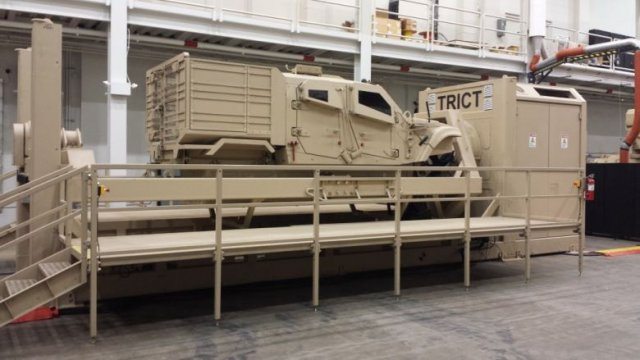Army software engineers faced a challenge: Saving Soldiers’ lives. With the development of new simulation applications, Soldiers can now use advanced computers to train for worst-case scenarios.
U.S. Special Operations Command representatives visited the U.S. Army Aviation and Missile Research, Development and Engineering Center, known as AMRDEC, at Redstone Arsenal, in the fall of 2012, to meet with Army engineers.
The visitors saw a Humvee simulator in a Software Engineering Directorate, or SED, laboratory, where a vehicle traveled down roads simulated by large screens placed in front of the vehicle. Soldiers could ride in the vehicle and walk beside it while a simulated enemy engaged the Soldiers.
The AMRDEC Software Engineering Directorate is behind the popular America’s Army video game.
The experience was both realistic and helpful to the visitors, who asked for the possibility of creating a simulator for mine-resistant, ambush-protected vehicles, known as an MRAPs, recalled Director Dr. Bill Craig. MRAPS were added to the Army inventory during recent conflicts.
Eighteen months later, the Army software engineers delivered. The Army now has a new simulator called the Transportable, Reconfigurable, Integrated, Crew Trainer, or TRICT. It is fully operational to train Soldiers and save lives.
“The TRICT is a fully immersive crew trainer for the MRAP,” Craig said. “TRICT supports warfighter capabilities for training individually, or collectively as a crew, the skills required to operate features of the RG-33 and M-ATV variant MRAP vehicles.”
The TRICT features a realistic exterior and interior, including all vehicle controls for steering, gas, brakes, instrument panels, differentials and transmission control gauge for the MRAP. The main cradle is integrated with a pitch-and-roll assembly providing full-motion-based training, and egress training during rollovers. All doors and windows are outfitted with LCD displays that create an immersive, computer-generated training environment using the Unreal 3.0 gaming engine.
“While inside the simulator, Soldiers experience realistic motions, and sounds, coupled with state-of-the-art graphics to ensure an immersive training environment,” said Scott Johnston, lead systems engineer for the project. “In short, it is a very realistic trainer.”
The design also allows for training on the joint tactical wheeled vehicles such as the Humvee, Joint Light Tactical Vehicle, and RG31 MRAPs.
“We were able to develop this product in the amount of time that it would normally take to do the request for proposal,” Craig said. “The development of the TRICT Simulator is an excellent example of a product that is centered on the needs of Soldiers and was developed inexpensively and rapidly.”
There are three simulators currently, and officials hope for more in the future.
ABOUT AVIATION AND MISSILE RESEARCH, DEVELOPMENT AND ENGINEERING CENTER
AMRDEC is part of the U.S. Army Research, Development and Engineering Command, klnown as RDECOM, which has the mission to develop technology and engineering solutions for America’s Soldiers.
RDECOM is a major subordinate command of the U.S. Army Materiel Command. AMC is the Army’s premier provider of materiel readiness — technology, acquisition support, materiel development, logistics power projection, and sustainment — to the total force, across the spectrum of joint military operations. If a Soldier shoots it, drives it, flies it, wears it, eats it or communicates with it, AMC provides it.










